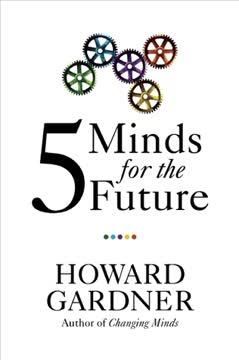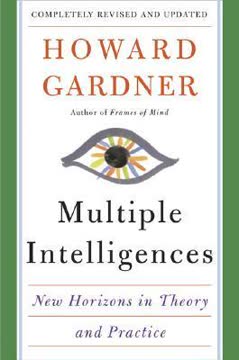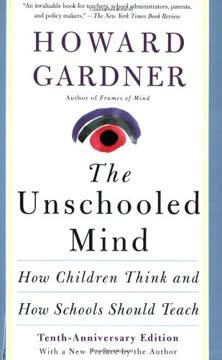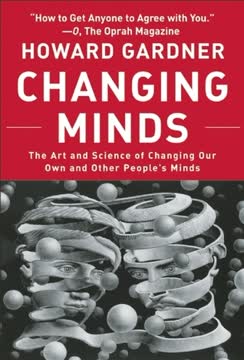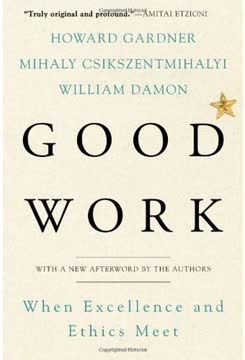Key Takeaways
1. The Future Demands Five Essential Minds
The empires of the future will be empires of the mind.
Navigating a new world. In an increasingly interconnected world shaped by rapid technological advancement and globalization, traditional ways of thinking are no longer sufficient. We face unprecedented challenges and opportunities that require new cognitive capacities. The author proposes five specific "minds" that are crucial for individuals and societies to thrive in the coming eras.
Beyond traditional intelligence. These five minds are not simply innate intelligences, but rather broad uses of the mind that can and must be cultivated through education, work, and lifelong learning. They represent a shift from merely describing how the mind works to prescribing the kinds of minds we should develop to meet future demands. Without these capacities, individuals risk being overwhelmed by complexity and at the mercy of forces they cannot comprehend or control.
A values enterprise. The selection of these five minds is not arbitrary; it reflects a belief in the human potential for excellence, connection, and responsibility. Developing these minds is presented as a moral imperative, essential not just for individual success but for the common good and the survival of the planet in an age where intolerance and unethical behavior pose existential threats.
2. Mastering the Disciplined Mind is Fundamental
Knowledge of facts is a useful ornament but a fundamentally different undertaking than thinking in a discipline.
Beyond memorization. A disciplined mind has mastered at least one distinct way of thinking characteristic of a scholarly discipline, craft, or profession. This goes far beyond simply accumulating facts or subject matter knowledge, which the author argues is often "inert knowledge" without context or application. True discipline involves understanding the methods, concepts, and modes of inquiry within a field.
Overcoming ingrained thinking. Developing a disciplined mind is challenging because humans are predisposed to rely on common sense or earlier, often erroneous, ways of thinking (e.g., Lamarckian evolution, unicausal history). Professional training also requires shedding old habits and adopting new, often counterintuitive, patterns of thought and behavior specific to the profession.
Cultivation requires depth. Fostering a disciplined mind involves:
- Identifying truly important topics/concepts.
- Spending significant time studying deeply.
- Approaching topics in multiple ways (using diverse entry points).
- Setting up "performances of understanding" to assess genuine application of knowledge to unfamiliar problems.
This process takes time, often a decade, and requires consistent effort and practice, embodying the second meaning of "discipline."
3. The Synthesizing Mind Connects Disparate Information
Hell is a place where nothing connects with nothing.
Essential in the information age. The capacity to synthesize information from disparate sources, evaluate it objectively, and organize it into a coherent whole is more critical than ever in a world drowning in data. The amount of knowledge is doubling rapidly, and individuals need to make sense of this deluge.
Forms of synthesis. Synthesis can take many forms, including:
- Narratives (stories, histories)
- Taxonomies (classifications, charts)
- Complex concepts (natural selection, the unconscious)
- Rules and aphorisms (folk wisdom, business maxims)
- Powerful metaphors and images (invisible hand, tangled bank)
- Embodiments in art (Guernica, Ring Cycle)
- Theories and metatheories
Effective synthesis requires selecting appropriate formats and tools based on the goal and audience.
Challenges and cultivation. Despite a childhood tendency to make connections, older minds become more context-specific, resisting broad generalizations. Interdisciplinary synthesis is particularly difficult, requiring mastery of multiple perspectives and risking superficial or misguided connections. Cultivating synthesis involves:
- Explicitly identifying goals and starting points.
- Selecting appropriate strategies and tools.
- Drafting and seeking feedback.
- Developing "multiperspectivalism" – appreciating different viewpoints even without full mastery.
- Learning "knowledge arts" – explicit strategies for creating taxonomies, metaphors, and theories.
4. The Creating Mind Breaks New Ground
I create; therefore I am.
Innovation is paramount. In a world where routine tasks are increasingly automated, the ability to generate new ideas, pose unfamiliar questions, and devise fresh solutions is highly valued. Creativity is no longer a luxury but a necessity for individuals and organizations to stay ahead.
Creativity as interaction. Creativity is not just an individual trait but emerges from the interaction of three elements:
- The individual: Possessing discipline, skill, and a specific temperament (dissatisfied, persistent, tough-skinned).
- The domain: The cultural field with its rules, models, and practices.
- The field: The social institutions and individuals who judge and ultimately accept or reject new contributions.
True creativity alters the domain and is recognized by the field, ranging from "little c" (daily innovations) to "big C" (transformative breakthroughs).
Nurturing the creative spark. Fostering creativity requires:
- Keeping alive the playful, exploratory sensibility of young children.
- Providing opportunities for open-ended exploration alongside disciplinary mastery.
- Exposing individuals to diverse perspectives and alternative systems.
- Encouraging productive mistakes and constructive criticism.
- Creating environments (in schools and workplaces) that tolerate and reward originality, rather than just conventionality.
The workplace must embed creativity in its DNA, not just relegate it to isolated teams, while also guarding against "pseudocreativity" based on falsehoods or lack of discipline.
5. The Respectful Mind Navigates Human Differences
In a world where we are all interlinked, intolerance or disrespect is no longer a viable option.
Essential for global coexistence. In an interconnected world with diverse groups and the potential for global conflict, learning to accept, understand, and work effectively with those different from ourselves is vital. Respect goes beyond mere tolerance; it involves valuing others despite differences.
Developmental roots and challenges. While infants show early signs of empathy, humans also have a deep-seated tendency to form in-groups and out-groups, often leading to prejudice and exclusion. These distinctions are culturally shaped and reinforced by role models. Overt displays of tolerance can mask covert biases, which are often fixed by adolescence.
Cultivating respect. Fostering respect requires:
- Providing positive role models (parents, teachers, leaders) who exhibit respect in daily interactions.
- Creating milieus (schools, communities, workplaces) where different groups work together and differences are valued.
- Using curricula (in history, arts, humanities) that explore group relations and diverse perspectives, confronting prejudice directly.
- Engaging in activities that build empathy and understanding (e.g., community service, cross-cultural projects).
- Being wary of "false respect" like "kissing up and kicking down" or mere political correctness; genuine respect is consistent and extends to all.
6. The Ethical Mind Serves Purposes Beyond Self
When everything that matters can be bought and sold, when commitments can be broken because they are no longer to our advantage, when shopping becomes salvation and advertising slogans become our litany, when our worth is measured by how much we earn and spend, then the market is destroying the very virtues on which in the long run it depends.
Work and citizenship. The ethical mind ponders the nature of one's work and role as a citizen, seeking to serve purposes beyond narrow self-interest. It involves reflecting on one's obligations and responsibilities within a profession and the wider community. This requires an abstract attitude, stepping back from daily life to conceptualize one's role.
Good work: Excellent, ethical, engaging. The author's research on "good work" highlights three facets:
- Excellent: Highly disciplined and skilled.
- Ethical: Responsible and considers implications for the community.
- Engaging: Meaningful and provides intrinsic satisfaction.
Achieving good work is easier in supportive environments (like Reggio Emilia) where ethical behavior is the norm, but individuals must also cultivate an internal compass.
Fostering ethical orientation. Developing an ethical mind is supported by:
- Positive role models (parents, mentors, leaders) who embody ethical values.
- Peers and colleagues who uphold high standards.
- Periodic "inoculations" – exposure to positive examples and cautionary tales (like corporate scandals).
- Strong institutional cultures that select and support ethical workers and sanction misconduct.
Ultimately, it depends on the individual's disposition and willingness to apply principles even when difficult, guided by the "four Ms": Mission, Models, Mirror Test (individual), and Mirror Test (professional responsibility).
7. Cultivating These Minds Requires Intentional Effort
It’s better for an aim to exceed one’s grasp than for one to aim too low or too narrowly.
An ambitious project. Developing the five minds – disciplined, synthesizing, creating, respectful, and ethical – is a significant challenge, requiring intentional effort across the lifespan and within various institutions. These minds are interconnected; discipline supports synthesis and creation, while respect and ethics govern interactions and purpose.
Lifelong learning and institutional roles. Cultivation begins in early childhood, where natural curiosity and connection-making should be nurtured. Formal education must move beyond rote learning to foster deep disciplinary understanding, provide opportunities for synthesis and creativity, and explicitly address issues of respect and ethics. Workplaces must continue this development, providing models, feedback, and environments that support all five minds.
Overcoming obstacles. Significant obstacles exist, including:
- The natural human tendency towards cognitive conservatism and in-group bias.
- Societal pressures that prioritize narrow expertise, short-term gains, or intolerance.
- Institutions that fail to model or support ethical and respectful behavior.
- The difficulty of assessing and rewarding these complex capacities.
Despite these challenges, the need for these minds is urgent in our globalized, technologically driven world.
The path forward. Fostering these minds requires:
- Explicitly valuing and prioritizing their development.
- Providing diverse experiences and role models.
- Encouraging reflection and self-assessment (the mirror tests).
- Creating environments that support collaboration, critical thinking, and ethical action.
- Recognizing that while individual effort is key, institutional and societal support are crucial for widespread cultivation. The goal is to equip individuals to navigate complexity, innovate responsibly, and contribute to a world worth living in.
Last updated:
FAQ
1. What is "Five Minds for the Future" by Howard Gardner about?
- Core Premise: The book explores the five types of minds that Gardner argues are essential for individuals to thrive in the future: the disciplined, synthesizing, creating, respectful, and ethical minds.
- Purpose: Gardner aims to describe and prescribe the mental capacities needed to succeed in a rapidly changing, globalized, and technologically advanced world.
- Scope: The book draws on psychology, education, history, and real-world examples to illustrate how these minds can be cultivated in both educational and professional settings.
- Audience: It is intended for educators, leaders, professionals, and anyone interested in personal and societal development.
2. Why should I read "Five Minds for the Future" by Howard Gardner?
- Future-Proofing Skills: The book provides a framework for developing mental habits and skills that are increasingly vital in the 21st century.
- Practical Guidance: Gardner offers actionable advice for educators, managers, and individuals on how to nurture these five minds in themselves and others.
- Broad Relevance: The concepts apply across disciplines, professions, and cultures, making the book valuable for a wide audience.
- Ethical and Social Emphasis: It goes beyond cognitive skills to address respect and ethics, which are crucial for a harmonious and sustainable society.
3. What are the five minds described in "Five Minds for the Future" by Howard Gardner?
- Disciplined Mind: Mastery of at least one way of thinking, characteristic of a specific scholarly discipline, craft, or profession, and the ability to work steadily to improve skills.
- Synthesizing Mind: The ability to integrate information from diverse sources, evaluate it objectively, and present it in a coherent, meaningful way.
- Creating Mind: The capacity to break new ground, generate novel ideas, pose new questions, and innovate beyond existing knowledge.
- Respectful Mind: The disposition to appreciate and work effectively with differences among individuals and groups, fostering collaboration and understanding.
- Ethical Mind: The ability to conceptualize one’s role as a worker and citizen, acting responsibly and unselfishly for the greater good.
4. How does Howard Gardner define and differentiate the "Disciplined Mind" in "Five Minds for the Future"?
- Definition: The disciplined mind is one that has mastered a specific mode of thinking, such as scientific, historical, or artistic, and can apply it effectively.
- Beyond Memorization: It goes beyond rote learning or subject matter knowledge, focusing on deep understanding and the ability to apply concepts in new situations.
- Continuous Improvement: Discipline also means developing habits of regular practice and lifelong learning within a chosen field.
- Risks of Lack: Without at least one discipline, individuals are vulnerable to manipulation and unable to make informed decisions in complex environments.
5. What is the "Synthesizing Mind" according to "Five Minds for the Future" by Howard Gardner, and why is it important?
- Definition: The synthesizing mind can select, organize, and integrate information from multiple sources, making sense of complexity for oneself and others.
- Types of Synthesis: Gardner identifies various forms, including narratives, taxonomies, metaphors, theories, and interdisciplinary integrations.
- Modern Relevance: In an age of information overload, the ability to synthesize is crucial for decision-making, learning, and leadership.
- Educational Challenge: Few institutions teach synthesis explicitly, making it a rare and valuable skill in both academic and professional contexts.
6. How does "Five Minds for the Future" by Howard Gardner describe the "Creating Mind" and its role in society?
- Definition: The creating mind is characterized by innovation, originality, and the willingness to challenge the status quo and venture into new territory.
- Not Just for Geniuses: Creativity is not limited to the arts or sciences; it is essential in business, leadership, and everyday problem-solving.
- Process and Personality: Creators are often dissatisfied with current answers, resilient in the face of failure, and open to criticism and feedback.
- Societal Impact: Societies and organizations that nurture creativity are more likely to adapt, thrive, and lead in times of rapid change.
7. What does Howard Gardner mean by the "Respectful Mind" in "Five Minds for the Future," and how can it be cultivated?
- Definition: The respectful mind values differences among people and groups, seeks to understand others, and works constructively across boundaries.
- Developmental Roots: Respect begins in early childhood and is shaped by family, education, and societal models.
- Beyond Tolerance: True respect involves active engagement and empathy, not just passive acceptance or political correctness.
- Cultivation: It is fostered through diverse experiences, inclusive curricula, positive role models, and open discussions about group relations and conflict.
8. How is the "Ethical Mind" defined in "Five Minds for the Future" by Howard Gardner, and why is it essential?
- Definition: The ethical mind reflects on one’s responsibilities as a worker and citizen, striving for good work that is excellent, responsible, and meaningful.
- Abstract Thinking: It requires the ability to step back, conceptualize one’s role, and act consistently with broader societal values.
- Supports and Threats: Ethical behavior is supported by positive role models, strong institutions, and periodic reflection, but threatened by peer pressure, institutional failures, and societal trends.
- Broader Impact: The ethical mind is crucial for sustaining trust, integrity, and the common good in professions and communities.
9. What practical advice does "Five Minds for the Future" by Howard Gardner offer for cultivating these five minds in education and the workplace?
- Start Early: Begin with fostering respect and basic literacies in early childhood, then introduce disciplinary thinking in elementary years.
- Integrate Synthesis and Creativity: Encourage synthesis and creativity through projects, multiple perspectives, and exposure to diverse role models.
- Model and Mentor: Teachers, leaders, and mentors should exemplify the five minds and provide feedback, support, and opportunities for practice.
- Lifelong Learning: Emphasize continuous development, adaptability, and ethical reflection throughout one’s career and civic life.
10. How does "Five Minds for the Future" by Howard Gardner address the challenges and obstacles to developing these minds?
- Conservatism and Faddism: Resistance to change and skepticism about new educational trends can hinder adoption of the five minds framework.
- Hidden Risks: Overemphasis on one mind (e.g., creativity without discipline) can lead to negative outcomes like chaos or superficiality.
- Impotence and Evaluation: Educators and leaders may feel unsure how to teach or assess these minds, requiring clear models and criteria.
- Societal Contradictions: Media, politics, and institutional practices may undermine the values of respect and ethics, making cultivation more difficult.
11. What are the key takeaways and main conclusions from "Five Minds for the Future" by Howard Gardner?
- Interdependence of Minds: The five minds are complementary and should be developed together for individuals and societies to flourish.
- No Zero-Sum: Cultivating one mind does not preclude others, but trade-offs and tensions (e.g., between respect and creativity) must be managed.
- Role of Education and Leadership: Schools, workplaces, and leaders have a shared responsibility to nurture these minds through intentional practices and policies.
- Human Survival and Thriving: The future of humanity depends on our ability to develop disciplined, synthesizing, creating, respectful, and ethical minds in the face of global challenges.
12. What are the best quotes from "Five Minds for the Future" by Howard Gardner, and what do they mean?
- “The empires of the future will be empires of the mind.” (Winston Churchill, cited by Gardner) – Highlights the centrality of mental capacities in shaping the future.
- “Education is inherently and inevitably an issue of human goals and human values.” – Emphasizes that education must be guided by clear purposes and ethical considerations.
- “Individuals without one or more disciplines will not be able to succeed at any demanding workplace and will be restricted to menial tasks.” – Stresses the necessity of deep disciplinary knowledge for meaningful work.
- “No society can be composed solely of creators; they are by nature destabilizing.” – Acknowledges the need for balance between innovation and stability.
- “The survival and thriving of our species will depend on our nurturing of potentials that are distinctly human.” – Concludes that the five minds are not just desirable but essential for the future of humanity.
Review Summary
Five Minds for the Future receives mixed reviews, with readers appreciating Gardner's insights on essential cognitive abilities for the future: disciplined, synthesizing, creating, respectful, and ethical minds. Many find the concepts valuable for educators and professionals. However, some criticize the book for being obvious or lacking depth. Positive reviewers praise Gardner's organization of common-sense ideas and their potential impact on education and society. Critics argue the content could have been condensed into a shorter format. Overall, readers acknowledge the importance of cultivating these five minds for success in a rapidly changing world.
Similar Books
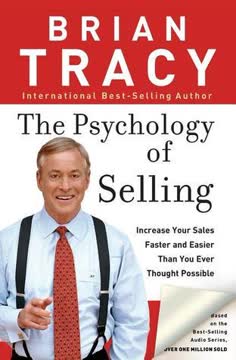




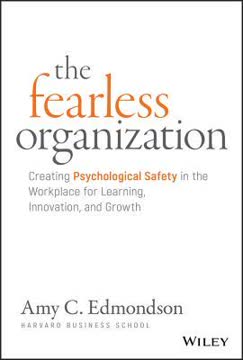
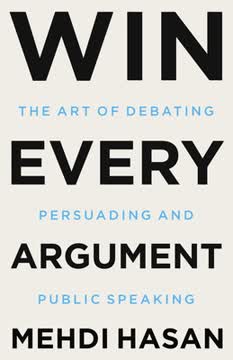
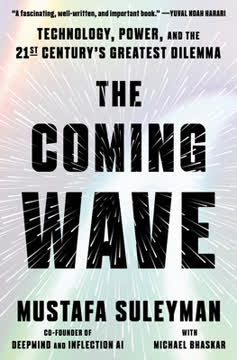
Download PDF
Download EPUB
.epub digital book format is ideal for reading ebooks on phones, tablets, and e-readers.
